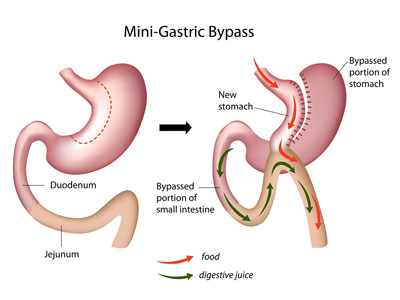Are you suffering from obesity and want to have an operation? A severe obesity surgical treatment requires the choice of an experienced professional. Discover what the criteria are for a good baria...
Gastric bypass
The gastric bypass or “gastric short circuit” is an operation that reduces the size of your stomach. The pocket created can hold between 15 and 25 ml. Doctor Jacques Himpens and Doctory Anne-Catherine Dandrifosse, obesity surgeon in Liège and Brussels, informs you about the subject.
By-pass gastric: bariatric operation the most practiced in Belgium
In Belgium and everywhere else, the bypass is a surgical intervention that is making itself known to treat obesity over the long term. It is the oldest operation to reduce excess weight in patients. Our country has a large concentration of world of practitioners offering to perform this type of surgery. In 2015, close to 7 900 bypasses were carried out in Belgium.
 What does gastric “short circuit” consist of? How is this obesity surgery carried out?
What does gastric “short circuit” consist of? How is this obesity surgery carried out?
The surgical procedure is performed by small skin incisions (laparoscopy) under general anaesthesia. The intervention, which we do is more or less than an hour long, consists of reducing the volume of the stomach and modifying the digestive tract. In the first place, the practitioner divides the stomach into two parts. The smaller part of the stomach – called pocket proximal- is the connected to the small intestines so the section of the stomach no longer wanted is left out.
Candidates for this type of obesity surgery are usually admitted to the hospital the day before surgery. The evening after the operation, the patient can already drink and walk a few steps. The next day, the patient can have a liquid diet. Then after the patient successfully accepts this diet, they are allowed to exit the hospital. Of course, a shorter or longer hospital stay may be considered on a case-to-case basis.
Discover the principles of a bypass in this video
Who should have a gastric bypass operation?
The medical criteria and insurance reimbursement conditions coexist to access this obesity surgery. In order to benefit from a partial refund from the gastric by-pass by Belgium, it is imperative to meet the following criteria:
- Be a minimum of 18 years old
- Have spent at least one year seriously trying to lose weight
- Have a BMI(body mass index, calculate here) superior or equal to 40 or superior or equal to 35 if you have comorbidity factors such as diabetes, arterial hypertension, sleep apnoea syndrome, etc.
- The patient’s surgeon must send a standard notification form to the medical adviser of the insurer
- A register council study containing of all the obesity surgeries whose modalities are established by the insurance committee must finally be held by the hospital in which the obese patient is admitted
Loss of excess weight after the bariatric surgery
Scientific studies show that weight loss between 5 and 10% of overall body mass allows an individual to improve a person’s health. Loss 50% of your excess weight as a result of obesity surgery is already a sign of success. After a bypass, the patient can expect a loss of up to 70-80% of their weight. These averages vary according to different factors specific for each individual: their genetics, their post-surgical efforts, their personal history, their lifestyle, etc.
Risks linked to bypass surgical intervention
The main risks directly related to the bypass operation are poor healing, haemorrhages, an ulcer, a vitamin deficiency, a pulmonary embolism or a repertory infection. The risk of complication can be significantly reduced by a good evaluation and optimal preparation before the operation. In addition, general anaesthesia also presents a potential risk which is more exposed a patient suffering from obesity.
Would you like complementary information or a consultation for a bypass?
Contact Doctor Jacques Himpens and Doctor Anne-Catherine Dandrifosse in the Liège or Brussels region. Our medical team will relay the necessary information to you as soon as possible.




